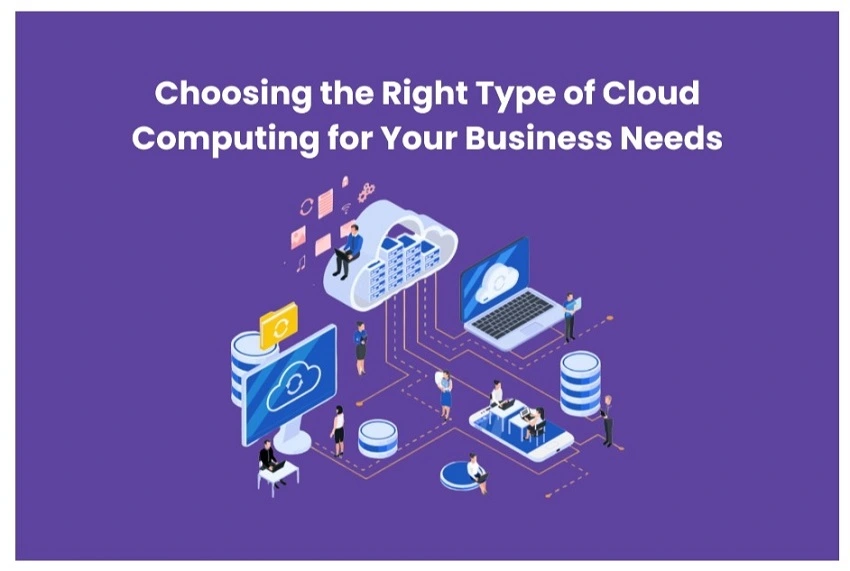Cloud computing in business technology has become essential for organisations seeking to maintain competitiveness.
A variety of solutions catered to different business needs are provided by cloud computing. Businesses are embracing digital change, so choosing the right kind of cloud computing becomes crucial.
Comprehending the complexities of cloud computing is essential, regardless of whether you’re an experienced IT specialist or a company owner hoping to use the cloud’s potential.
Together, let’s go out on our mission to explain the cloud. If you’re excited to learn more about this area, consider taking a Cloud Computing Course Online to improve your knowledge.
In this blog, we’ll dive into the subtleties of cloud computing, covering various Types of Cloud Computing and helping you make wise business choices.
Understanding the Basics of Cloud Computing
Let us lay the groundwork before exploring the many kinds of cloud computing. Fundamentally, cloud computing is the internet-based supply of computer services, such as processing power and storage.
This novel paradigm promotes cost-effectiveness, scalability, and agility by doing away with the need for companies to maintain physical hardware.
Let’s now unravel the complex maze of cloud services. Consider enrolling in an online course on cloud computing to get a thorough knowledge of the fundamentals.
Infrastructure as a Service (IaaS)
Infrastructure as a Service (IaaS) is a prominent building component in cloud computing. Through the internet, this kind of cloud service offers virtualised computer resources.
IaaS allows companies to grow their infrastructure without worrying about maintaining real hardware. It resembles having a portable virtual data centre at your disposal.
Platform as a Service (PaaS)
Platform as a Service (PaaS) is a game-changer for companies looking to optimise their development processes.
With the help of PaaS, developers can create, launch, and maintain apps without worrying about the supporting infrastructure. This leads to quicker development cycles and better teamwork.
Software as a Service (SaaS)
Software as a Service (SaaS) is the dominant technology in a world where software applications rule the day. This kind of cloud computing uses subscriptions to distribute software programs via the internet.
These programs don’t need installation or upkeep for users to use them. This guarantees that organisations are constantly utilising the most recent version of the software and makes accessibility simpler.
Public Cloud
Third-party suppliers provide public cloud services, which several companies and people share. This kind of cloud computing offers global accessibility, cost-effectiveness, and scalability.
It resembles a virtual area where resources are gathered and allocated as required.
Private Cloud
In contrast to a public cloud, a private cloud is exclusive to one company. This private setting offers more security, control, and personalisation choices.
It’s similar to having a custom cloud infrastructure to fit your company’s requirements.
Hybrid Cloud
Acknowledging the diversity of demands from enterprises, the hybrid cloud model has surfaced as a hybrid resolution.
Combining aspects of both allows data and apps to be exchanged across public and private clouds. This provides a planned and adaptable strategy that lets organisations use both models’ benefits.
Navigating Security Concerns in the Cloud
Although the cloud offers many benefits, it is crucial to address security issues. As companies change how they operate, protecting the privacy and security of data becomes essential.
It’s critical to comprehend the security features of the different kinds of cloud computing. Every model has a unique collection of security measures, ranging from authentication methods to encryption algorithms.
Maximising Efficiency with Cloud Cost Management
In cloud computing, cost optimisation is a crucial factor. Effective cloud cost management is knowing how various cloud services are priced, keeping an eye on how resources are used, and putting cost-cutting measures in place.
Every model, whether it is spot instances, reserved instances, or pay-as-you-go, has subtle differences. Explore cloud cost management and learn how to properly balance spending and performance.
Conclusion
Organizations must carefully select the appropriate type of cloud computing based on factors like business objectives, data sensitivity, and scalability needs.
Whether opting for public, private, hybrid, PaaS, SaaS, or IaaS cloud computing, it’s crucial to make informed decisions.
To enhance your knowledge and confidence in navigating this dynamic landscape, explore online Cloud Computing Courses.
In today’s digital era, agility and efficiency are paramount, and a well-chosen cloud computing solution can contribute to your company’s success. Stay informed, stay adaptable, and approach the cloud with purpose.



![itms-appss://apps.apple.com/app/instagram/id389801252?vt=lo [2024] 3 itms-appss://apps.apple.com/app/instagram/id389801252?vt=lo](https://trendingserve.com/wp-content/uploads/2024/06/All-the-Information-You-Require-about-Instagram-on-Apple-Devices.webp)

One thought on “Choosing the Right Type of Cloud Computing for Your Business Needs”